Picture
Your Present Location: HOME> PictureThe 7th China-Russia Economy Dialogue Held at Suzhou
At the 70th Anniversary of the Establishment of Diplomatic Relations between China and Russia, in order to further promoting the Sino-Russia comprehensive strategic cooperation in the new era, and deepening the initiative of cultural exchange between China and Russia. Meanwhile for the purpose of jointing the "Belt and Alliance", the seventh China-Russia Economy Dialogue was successfully held on November 29th at the Suzhou campus of Renmin University of China. More than 100 representatives of the political, business, and academic community from China, Russia, Kazakhstan, and the United Kingdom attended the dialogue.
The dialogue was hosted by Renmin University of China, and organized by the Silk Road School, Renmin University of China (SRS), Chongyang Institute for Financial Research, Renmin University of China (RDCY), the Research Group led by Minister for Integration and Macroeconomics of the Eurasian Economic Commission, and Russian Academy of Sciences. It was also strongly supported by Suzhou government and Suzhou Dushu Lake Science and Education Innovation District.
At the opening ceremony, Du Peng, Vice President of Renmin University of China and Dean of Silk Road School, Cao Houling, Deputy Mayor of Suzhou, and Liu Jianqing, Director of Eurasian Division, Department of International Cooperation and Exchanges, Ministry of Education gave the opening speeches.
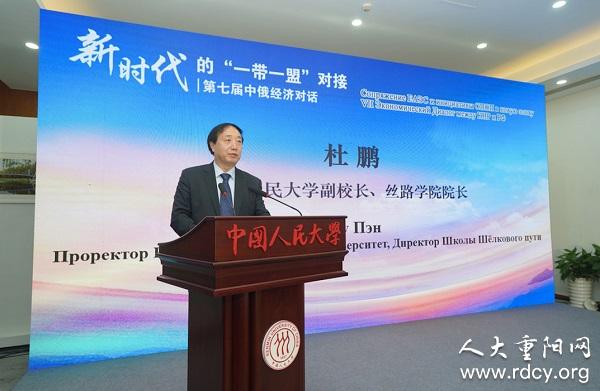
Du Peng said the cooperation in economic and trade has developed rapidly. In 2018, Sino-Russian trade exceeded 100 billion US dollars. In this context, Sino-Russian cultural exchanges have flourished. Chinese and Russian universities represented by the Renmin University of China have actively carried out various forms of human-cultural exchanges. Utilizing the advantages of disciplines and the characteristics of think tanks, they have provided a strong foundation for cultural exchanges. A solid accumulation of research has effectively consolidated the relations between two countries. To implement the BRI, Silk Road School is the first unit in China to provide connectivity for students from countries and regions along the “Belt and Road”. RDCY has promoted the cultural exchanges from both official and private channels. The past six dialogue session contributed to the development of Sino-Russian relations in a healthier and more pragmatic direction.
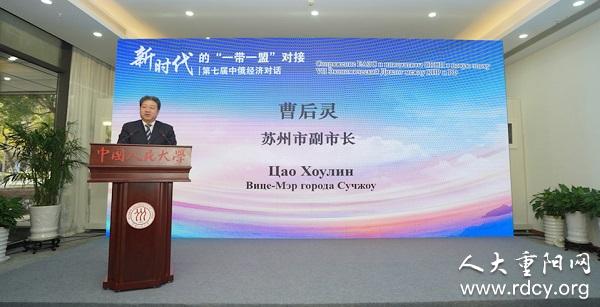
Cao Houling emphasized that Suzhou government and Renmin University of China signed a contract to build Silk Road School in 2018, which provided an important opportunity for Suzhou to open up to the outside world and international cultural and educational exchanges. With the 70th Anniversary of the Establishment of Diplomatic Relations between China and Russia, Suzhou and Russia launched a series of pragmatic cooperation in the fields of economy, trade, culture, education and other fields.
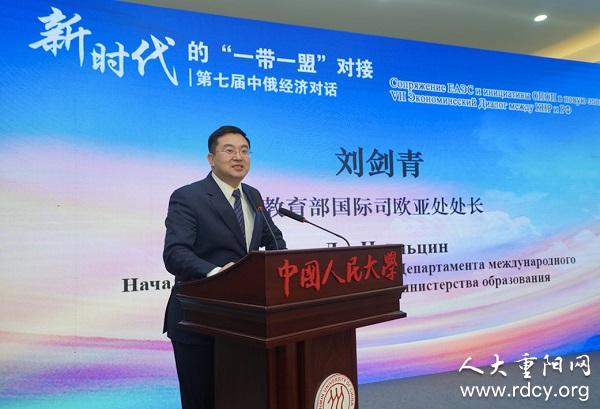
Liu Jianqing stated that the dialogue was held on the background of the reconvened meeting between President Xi Jinping and President Putin on November 13. The BRI and EEU has many issues that need to be faced and overcome. He has three suggestions of cooperation with China-Russia think tanks. Firstly, adhere to the goal-oriented approach to advance the research work of think tank. Secondly, cooperation in various fields must be problem-oriented. Thirdly, adhere to the humanistic orientation, inherit friendship from generation to generation, and consolidate people-to-people friendship.
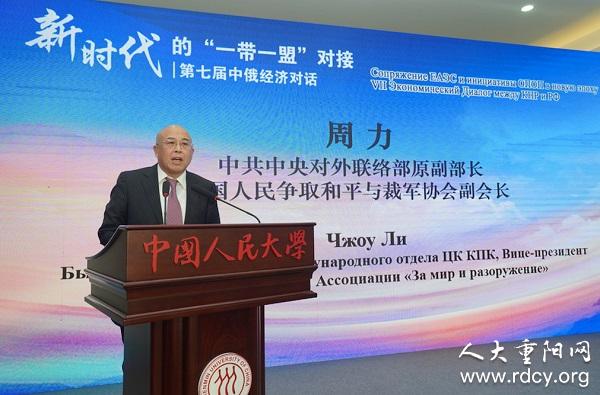
During the keynote speech, the Former Vice Minister of International Department Central Committee of CPC Zhou Li delivered a speech on "The Current International Situation and China-Russia Relations". As America targets China and Russia as the main strategic competitors, under the new situation, the focus of strategic cooperation between China and Russia could be in the following six fields: First, maintaining and accelerating the domestic economic construction of China and Russia. Second, the urgency to prevent the Color Revolution has greatly increased. Third, strengthen co-construction of national governance system and governance capacity building. Fourth, further strengthen international and regional affairs cooperation. Fifth, further develop and strengthen the Shanghai Cooperation Organization. Sixth, strengthen Sino-Russian education cooperation. Zhou Li also stated that China needs to strengthen bilateral and various cooperation with Kazakhstan.
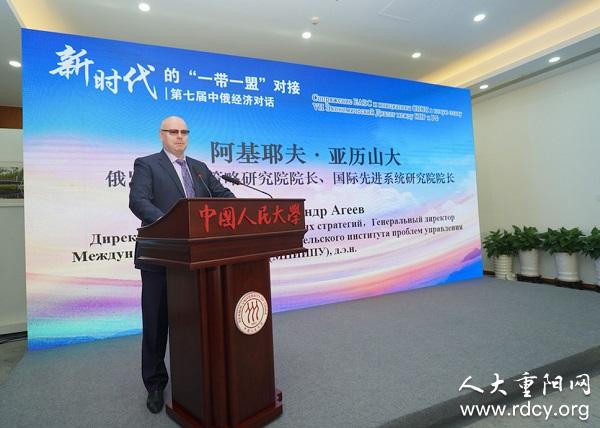
Alexander Ageev, Director General of the Institute of Economic Strategies, Director of the International Research Institute for Advanced Systems (IRIAS), said that it is necessary to deepen the development of the financial cooperation mechanism between the two sides and strengthen humanities and education cooperation. He looks forward to having more dialogue and exchanges between China and Russia, especially between the young people, and hoping to bring more new ideas and more influential perspectives into the field of research. He also emphasized that China and Russia are not only neighbors but also friends and brothers. In the future, the two countries will further cooperate closely in economic, political, military, humanities and other aspects to jointly shape a better future.
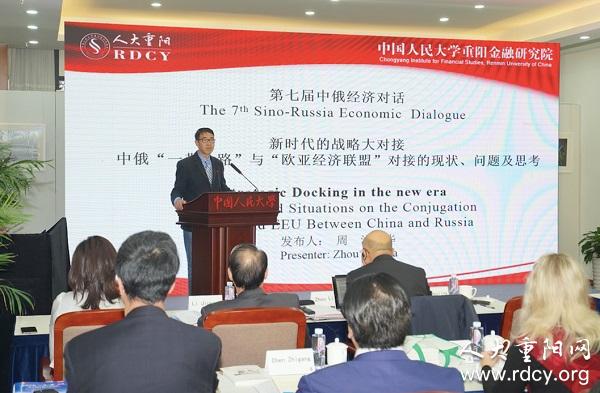
Subsequently, Zhou Luohua, Deputy Dean of RDCY, and Arkhipova Violetta, Senior Researcher of Institute of Economics RAS, PhD, jointly released the China-Russia joint research report 2019 in Chinese and Russian languages: The Strategic Synergy in the New Era - Questions and Situations on the Conjugation of EEU and BRI between China and Russia, Dr. Sergey Glaziev’s Book in Chinese language: The Last World War - the one that USA started and lost, and China-Russia joint book in Chinese language: A New Era of Eurasia: Sino-Russia Think Tanks Joint Research on the New Increments of Joint Rejuvenation.
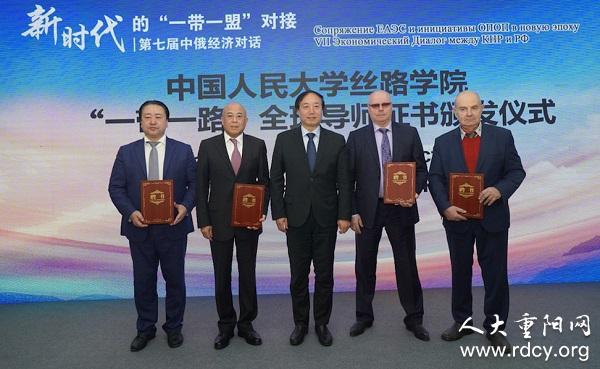
At the launch ceremony, Vice President Du Peng issued certificates of“BRI Global Mentor of Silk Road School at Renmin University of China” to 4 experts: Vice Minister Zhou Li, Chen Zhigang, the Foreign Member of RANS, Chairman of the Russian-Chinese Association for the Studies and Development of the “Belt and Road” Strategy, Chairman of the Russian-Chinese “Belt and Road” Strategic Development Research Association, Ageev Alexander, and Nagorny Alexander, Vice-President of the Political Experts and Consultants Association, Deputy editor-in-chief (newspaper “Tomorrow”), Deputy Chairman of the Izborsky Club.
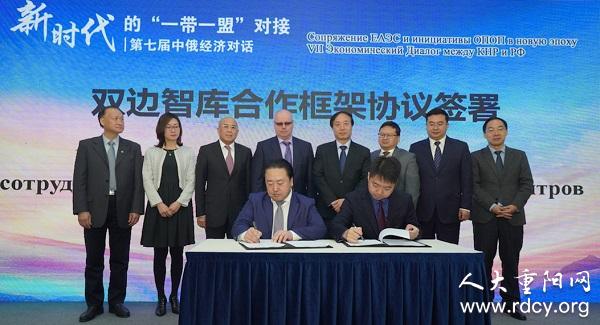
A bilateral think-tank cooperation framework agreement was signed at the opening ceremony. RDCY was represented by Executive Dean Wang Wen, signed the contracts separately with Ageev Alexander represented Russian International Advanced Systems Research Institute and Chen Zhigang as the representative of Silk Road Institute of the Eurasian Economic Union Parliamentary University.
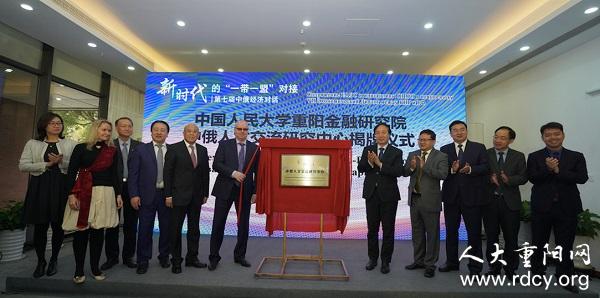
Under the direction of the Department of International Cooperation and Exchanges, Ministry of Education, the China-Russia People-to-People Exchange Research Center of RDCY was established successfully during the ceremony.
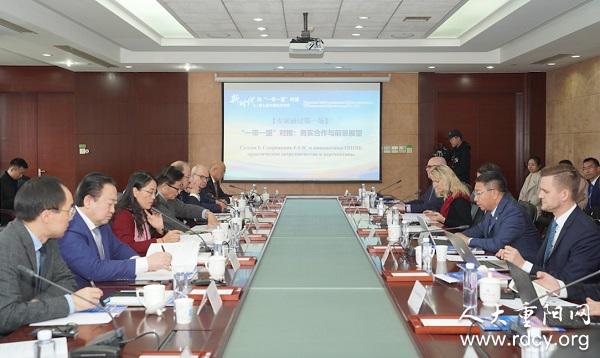
This dialogue also invited experts from Chinese Academy of Social Sciences, the Institute of Contemporary China and the World, Fudan University, East China Normal University, the Far Eastern Institute of the Russian Federation Academy of Sciences, the Economic Research Center of the Russian Federation Academy of Sciences, the Economic Policy Research Office of the Macroeconomic Policy Division of the Eurasian Economic Commission, the University of Finance of the Russian Federation, the Russian Political Experts and Consulting Association, and the Kazakhstan JSC Finance Institute .
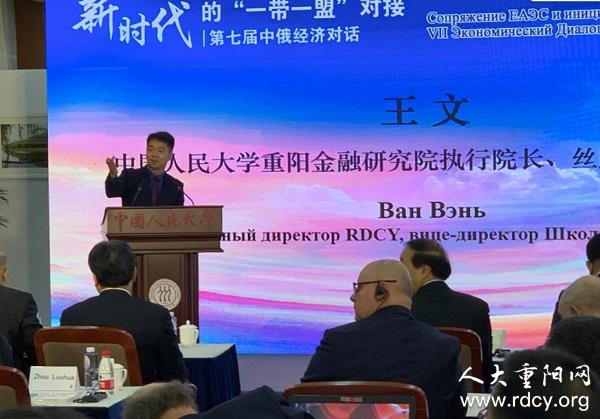
Wang Wen, Executive Dean of RDCY, said that previous 6 rounds of China-Russia Economy Dialogue had practical results. He made three suggestions on the concerns of participants: First, we must firmly believe that both sides are in the process of development and that we have confidence in each other. A friendly and long-term strategy will surely go on with each other more firmly. Second, there must be more cooperative research reports at the elite level. To continue long-term cooperation, we can go to different cities to see and fully understand China. Thirdly, it is necessary to take a longer-term perspective to look at the problems existing on both sides, and not to be overly anxious, to solve them slowly.
The seventh China-Russia Economy Dialogue continued the spirit of "pragmatic", united many think tanks from China, Russia, and Kazakhstan, and started from the 70 years of Sino-Russian diplomatic relations. Also carry out "Two-Track Diplomacy", exploring solutions to practical problems, achieve high-quality cooperation, and contribute to the development of Sino-Russian relations.
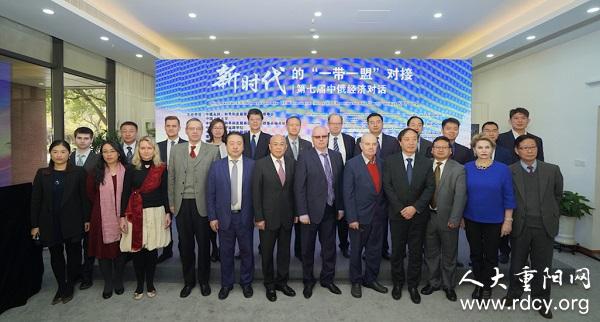
Lu Naquan, honorary member of the Chinese Academy of Social Sciences, Deputy Director of the Institute for Russian Studies at CASS; Xing Guangcheng, Professor and Director of the Institute of Chinese Frontier Studies, Chinese Academy of Social Sciences; Yu Yunquan, Dean of Academy of Contemporary China and World Studies, China International Publishing Group (CIPG); Qu Wenyi, Professor, Center for Russian Studies, East China Normal University; Fengyujun, Vice Dean, Institute of International Studies at Fudan University, Director of Center for Russian and Central Asian Studies, Fudan University; Li Jiugao, Deputy Director of Board of Management Renmin University of China Suzhou Campus, Dean of International College, Dean of Sino-French Institute, Deputy Dean of Silk Road School, Renmin University of China; Korzhova Natalya, President of the “Financial Academy” JSC; Razdolsky Elena, Advisor to the President of the “Financial Academy” JSC; John Ross, Former Director of the Department of Economic and Business Policy of London, Senior Fellow of RDCY; Faynitskiy Dmitriy, MA Student of Financial University under the Government of the Russian Federation; Wang Hongli, Director of General Office, Silk Road School; Zhu Fengyu, Director of Academic Services Office, Silk Road School and other staff of RDCY also attended the dialogue.























































































 京公网安备 11010802037854号
京公网安备 11010802037854号





